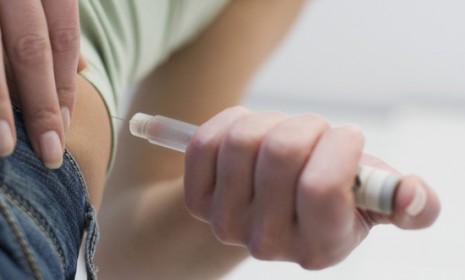Can an artificial pancreas defeat diabetes?
Type 1 diabetics lead complicated lives in which a miscalculated dose of insulin — or one missed altogether — could spell death. Help is on the way

A free daily email with the biggest news stories of the day – and the best features from TheWeek.com
You are now subscribed
Your newsletter sign-up was successful
Type 1 diabetes is at best a huge nuisance and at worst a constant threat of death for up to 3 million Americans whose pancreases don't produce insulin. Technology has improved the life of some diabetics, with insulin pumps replacing manual injections and glucose monitors that keep constant watch of diabetics' blood-sugar levels, reducing the need for finger-pricks. Yet diabetics are still required to frequently monitor and adjust their insulin levels. Now one company, Animas Corp., has completed the first successful human trial of a made-for-market artificial pancreas that takes care of everything automatically. Are we on the verge of relegating type 1 diabetes to an easily manageable condition? Here's a look at the quest to ease the lives of diabetics:
How does an artificial pancreas work?
The replacement pancreas ties together an insulin pump, a glucose monitor, and a computer system that automatically adjusts insulin levels, creating a "closed-loop" system. Animas' Hypoglycemia-Hyperglycemia Minimizer (HHM) currently uses a laptop to predict how much insulin a patient will need, based on individualized algorithms, and regulates levels accordingly, but the company hopes its artificial pancreas will soon be operated by smartphone, or a processor in the insulin pump. Rival artificial pancreases that are in development — one from Boston and Harvard unversities, and the other from the University of Virginia and an international consortium of researchers — already operate by smartphone.
The Week
Escape your echo chamber. Get the facts behind the news, plus analysis from multiple perspectives.

Sign up for The Week's Free Newsletters
From our morning news briefing to a weekly Good News Newsletter, get the best of The Week delivered directly to your inbox.
From our morning news briefing to a weekly Good News Newsletter, get the best of The Week delivered directly to your inbox.
How did the HHM work in the field?
The artificial pancreas worked very well, but the trial only had 13 subjects, lasted about 20 hours, and took place under constant medical supervision at a hospital. The next step will be having patients use the HHM part-time in the hospital and part-time at home, then finally letting diabetics use it completely on their own. The artificial pancreas developed by the University of Virginia just started outpatient testing, and researchers expect the trials to ramp up and last through 2013.
Is an artificial pancreas a sure thing?
"Diabetics regularly receive glowing news about the latest and greatest leaps forward in insulin technology," and they're often disappointed, says Heather McClellan at The Escapist. This looks to be different, and an artificial pancreas is probably in the cards. That could be great — if diabetics are willing to entrust their lives to a machine that will "always carry the risk of mechanical failure or a snafu in the software."
A free daily email with the biggest news stories of the day – and the best features from TheWeek.com
So when might diabetics be able to use one?
An artificial pancreas is "still a long way off," says Meeri Kim at the Philadelphia Inquirer. How long? "I wish I could give you a time frame — two years, four years, a decade," says Animas chief medical officer Henry Anhalt. "Given the regulatory hurdles, we are moving as quickly as possible." Even when the pancreas does hit the market, it won't be cheap: An Animas insulin pump alone costs $6,343, for example. Still, many insurers will probably pick up the tab. If science pulls this off, diabetics will not only live better and healthier, but potentially eat normally, too, says Andrew Tarantola at Gizmodo. In other words, we will essentially "solve type 1 diabetes."
Sources: Chicago Now, Escapist, Gizmodo, HealthDay News, Philadelphia Inquirer, Science Daily, Voice of America
-
 Nordic combined: the Winter Olympics sport that bars women
Nordic combined: the Winter Olympics sport that bars womenIn The Spotlight Female athletes excluded from participation in demanding double-discipline events at Milano-Cortina
-
 Samurai: a ‘blockbuster’ display of Japanese heritage
Samurai: a ‘blockbuster’ display of Japanese heritageThe Week Recommends British Museum show offers a ‘scintillating journey’ through ‘a world of gore, power and artistic beauty’
-
 BMW iX3: a ‘revolution’ for the German car brand
BMW iX3: a ‘revolution’ for the German car brandThe Week Recommends The electric SUV promises a ‘great balance between ride comfort and driving fun’